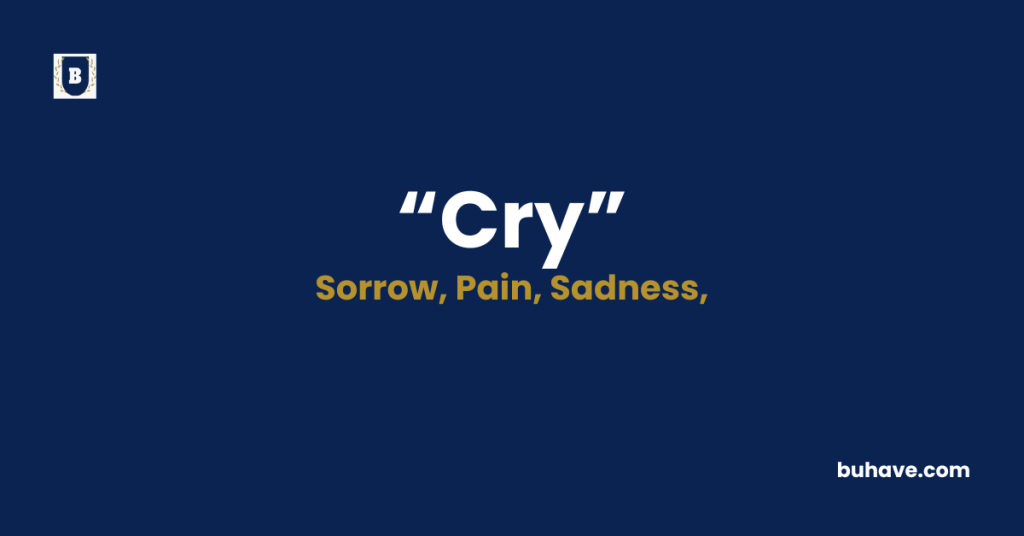The word Cry (Noun) refers to the act of shedding tears, often as an expression of emotion such as sadness, pain, or joy. In this guide, you’ll learn the full definition, synonyms, antonyms, etymology, and real-life examples of how to use Cry correctly in sentences.
Cry Explained in Depth
A complete and detailed guide to the word Cry including meaning, definition, examples, etymology, synonyms, and antonyms.
Meanings of Cry
Cry means to shed tears, typically in response to emotional or physical feelings. It can express grief, frustration, or happiness. As a noun, it can also refer to a loud call or shout made by a person or animal.
Definition
Cry is both a verb and a noun. As a verb, it describes the act of weeping or making a loud sound due to emotional or physical experiences. People cry when overwhelmed by sadness, stress, or relief. It can also occur during moments of deep happiness or connection. As a noun, it can refer to the sound of weeping, a loud exclamation, or a call for help. Crying is a natural human response. It is also a form of non-verbal communication. Infants cry to signal hunger or discomfort. Adults may cry due to grief, loss, or intense feelings. Some cultures view crying as a sign of strength.
Others may associate it with vulnerability. It plays an important role in emotional release and mental health. Crying helps to express feelings that words sometimes cannot capture. It is a universal behavior, present across ages, cultures, and species.
Etymology
The word “cry” originates from the Old French word crier, meaning “to shout or scream,” which comes from the Latin root quiritare, meaning “to call out or raise a public outcry.” In English, it entered during the Middle English period with meanings related to shouting, weeping, and emotional expression. Over time, the meaning expanded to include shedding tears. This emotional depth became central to the word’s modern use. The term evolved alongside cultural shifts in how people view emotional openness.
Its origin shows that crying was once more associated with shouting or calling attention. Today, the focus is equally on emotional vulnerability. Still, the dual sense of vocal and emotional outburst remains at the heart of the word’s meaning.
Example Sentences
- The baby began to cry when she was hungry.
- He tried not to cry during the emotional speech.
- She let out a cry of joy after receiving the good news.
Cry Synonyms
- Weep
- Sob
- Bawl
- Lament
- Wail
- Yell
- Howl
- Scream
- Shout
- Mourn
Cry Antonyms
- Laugh
- Smile
- Cheer
- Rejoice
- Celebrate
- Chuckling
- Grin
- Exult
- Delight
- Beam
FAQs about Cry
Here are some frequently asked questions (FAQs) about the word “Cry”
1. What does “cry” mean emotionally?
It refers to shedding tears due to strong feelings like sadness, pain, or joy.
2. Is crying a sign of weakness?
No. Crying is a natural emotional response and can reflect empathy, strength, or sensitivity.
3. Can animals cry?
Some animals make distress sounds, but humans are unique in crying emotional tears.
4. What are common reasons people cry?
Grief, stress, joy, frustration, and relief are all common reasons people cry.
5. Is it healthy to cry?
Yes. Crying can help reduce stress and release emotional tension.

















